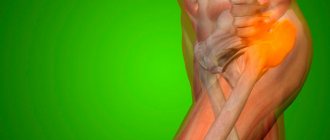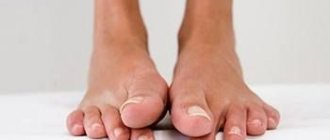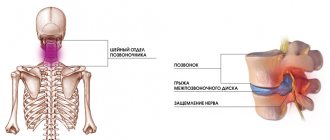A full, sound sleep indicates that the human nervous system functions stably and there is no reason for concern. However, people of different ages can wake up in the middle of the night due to unpleasant sensations - numbness in their arms and legs . Doctors call this disorder paresthesia . As a rule, it is accompanied by a feeling of tingling and aching pain. If you move a numb limb, the unpleasant feeling will only intensify. To ensure that numbness in the arms and legs no longer appears during sleep, it is necessary to understand the prerequisites for the occurrence of this problem.
When to visit a doctor
When your hand becomes numb due to an uncomfortable position and this happens infrequently, then there is no need to worry. An uncomfortable position during sleep leads to pressure on blood vessels and nerves, resulting in a numb hand. As a rule, in such cases there is no need to go to the clinic, however, you should start to worry if this happens every night; a stiff arm interferes with sleep and causes painful discomfort.
Clinical manifestations will help the doctor make a correct diagnosis; several conditions can be identified:
- hands go numb at any time of the day;
- right hand goes numb;
- left hand goes numb;
- both hands become numb;
- numbness lasts a long time and brings significant discomfort;
- hands suddenly become numb, with additional deterioration of vision and mental disorders.
You should pay close attention to your condition and consult a doctor, because only he can find out why your hands become numb in your sleep; the reasons can be completely different:
| Characteristic manifestations | Causes of discomfort |
| Both hands go numb at once or alternately | It can be assumed that there are disturbances in the central nervous system. Most often, the cause of this condition will be osteochondrosis or intervertebral hernia. |
| Only the right hand goes numb | Most likely, the cause will be carpal tunnel syndrome, arthrosis, cervical osteochondrosis. This condition may also be a precursor to a stroke. |
| Only my left hand is numb | The reason most likely lies in cardiac diseases. Numbness of the hand during the daytime may signal the imminent onset of a heart attack or micro-stroke, so you should immediately visit a specialist |
Why do my fingers go numb?
Physiological reasons
In a healthy person, numbness in the fingers occurs due to prolonged exposure to an uncomfortable position, caused by compression of blood vessels, and local circulation disorders.
The symptom appears when waking up after sleep with a hand placed under the pillow or under the head. It can be observed when resting on your back with your arms behind your head. Combined with tingling, feeling of “disobedience” of the hand. It goes away on its own within 5-10 minutes. Another reason for numbness in the fingers is prolonged exposure to the cold. The decrease in sensitivity is caused by vasospasm and may be accompanied by aching pain. It is considered a sign indicating the possibility of developing frostbite in the absence of warming measures.
Neuropathies
Numbness is one of the first symptoms of neuropathy. In the initial stages it appears periodically, accompanied by a feeling of tingling, “crawling goosebumps”. Subsequently, hypoesthesia becomes permanent, accompanied by pain, muscle weakness, changes in the skin and soft tissues. The area of numbness is determined by the affected nerve:
- Radial nerve neuropathy.
When the nerve trunk is involved in the upper third of the shoulder, sensitivity in the area of 1, 2, and partially 3 fingers is impaired. When affected at the level of the forearm, hypoesthesia occurs only on the back of the fingers. - Ulnar nerve neuropathy.
On the palmar surface, the little finger and half of the ring finger are numb, on the back - half of the 3rd finger, completely 4-5 fingers. - Median nerve neuropathy.
On the palmar side, numbness appears in the 1st-3rd and half of the 4th fingers; on the dorsal side, sensitivity decreases in the area of the nail phalanges of the 2nd-5th fingers. - Carpal tunnel syndrome.
Damage to the median nerve due to compression in a narrow bone canal is manifested by numbness of 1-3 fingers.
Polyneuropathy
Multiple neuropathies occur in some rheumatic and oncological diseases, severe kidney and liver diseases. They can be provoked by severe infectious processes, occupational hazards, and exogenous intoxications. There is symmetrical involvement of the limbs. The causes of numbness are:
- chronic inflammatory demyelinating polyneuropathy;
- neural amyotrophy of Charcot-Marie-Tooth;
- Roussy-Lévy syndrome;
- Refsum's disease;
- alcoholic polyneuropathy;
- polyneuropathy of pregnancy;
- neuroacancytosis;
- neuroAIDS;
- polyneuropathy with systemic vasculitis.
Numbness of fingers
Diabetes
Diabetic neuropathy is a special case of polyneuropathy. Can be diagnosed in patients with any form of diabetes. The likelihood of developing neuropathy depends on the duration and severity of the underlying disease. The pathology is manifested by numbness, burning, tingling, pain, short-term cramps, distorted perception of temperature and tactile stimuli, and muscle weakness. The hands suffer less than the feet.
Other neurological pathologies
Numbness of the fingers is included in the clinical picture, but, as a rule, is not a leading symptom in the following diseases:
- Cervical plexitis.
Develops with osteochondrosis of the spine, intervertebral hernia. It becomes a consequence of birth trauma, fractures, bruises and subluxations of the cervical spine, and some infectious diseases (sore throat, flu, tuberculosis). It is formed due to compression of the nerve plexus by a cervical rib or enlarged lymph nodes. - Brachial plexitis.
The causes of damage to the brachial plexus are injuries to the clavicle and shoulder joint, compression by lymph nodes, aneurysm or tumor, compression in bedridden patients and people using crutches, infectious, dysmetabolic diseases. - Horner's syndrome.
Damage to sympathetic nerve fibers occurs against the background of brachial plexus blockade, improper drainage placement, Pancoast cancer, aortic aneurysm, multiple sclerosis, otitis media, and thyroid diseases.
Persistent numbness of the fingers may be a consequence of damage to the spinal cord and brain due to spinal cord injury, head injury or hemorrhage. Other possible provoking factors are malignant and benign brain tumors, neurorheumatism. Short-term hypoesthesia occurs in the presyncope period in patients with neurocardiogenic syncope.
Raynaud's syndrome
Paroxysmal ischemia of the hands in typical cases is most clearly manifested in the area of 2 and 4 fingers. First, there is numbness, coldness and paleness of the fingers, then - swelling, burning, aching pain. The attack ends with a feeling of heat and sharp redness of the fingers. Raynaud's syndrome is detected in the following cases:
- Rheumatic diseases
: SLE, scleroderma, rheumatoid arthritis, systemic vasculitis. - Neurological pathologies
: diencephalic disorders, damage to the sympathetic ganglia, compression of the neurovascular bundles. - Other conditions
: hematological and endocrine diseases, systematic hypothermia, vibration disease.
Traumatic injuries
Short-term numbness of the hand is possible with any injury accompanied by significant swelling of the limb; it develops against the background of vascular compression. Loss of sensitivity in combination with intense pain that is not relieved by non-narcotic analgesics indicates the development of a serious complication - myofascial compartment syndrome, which requires urgent medical attention to preserve the viability of the limb.
A special case of compression due to injury is the increase in swelling in the first days after fixing the arm in a plaster cast. The fingers become numb, turn blue, and become sausage-shaped due to swelling. The patient complains of strong pressure from the cast. The symptom disappears after loosening the bandage, which should be done in a trauma room.
In case of wounds with a violation of the integrity of the nerve trunks, numbness of the fingers develops immediately after the injury and is combined with movement disorders. The area of loss of sensitivity corresponds to the area of hypoesthesia with neuropathy of the corresponding nerve.
Other reasons
Diseases and pathological conditions accompanied by numbness of the fingers include:
- Hypertonic disease.
The symptom appears with a persistent increase in systolic pressure above 140-160 mmHg. Art., combined with swelling of the hands, redness of the face, sweating, and prolonged pain in the heart area. - Anemia.
Hypoesthesia of the fingers is complemented by malaise, weakness, fatigue, shortness of breath, palpitations, headache, and impaired concentration. Dizziness and fainting are possible. - Lack of vitamins.
Vitamin B1 deficiency in the peripheral form of beriberi is manifested by weakness, numbness of the feet and hands, and difficulty in minor operations requiring fine movements of the fingers. Lack of B12 provokes peripheral neuropathy. - Takayasu's disease.
Numbness of the fingers with nonspecific aortoarteritis is potentiated by ischemia of the upper extremities. Sensory disturbances are complemented by coldness, absence or weakening of the pulse in the arteries of the limb. - Dercum's disease.
Multiple lipomas compress the cutaneous branches of the peripheral nerves, resulting in pain, numbness of the fingers, and impaired fine motor skills. - Mental disorders
. Temporary numbness of the fingers (more often paroxysmal) is observed with panic attacks, phobic disorders, and hysterical neurosis. Sometimes it is combined with tremor, coldness, and a feeling of crawling goosebumps.
Incorrectly selected pillow and uncomfortable sleeping position
In order for the body to fully recover and gain strength during sleep, it is important that the pillow is comfortable, and preferably orthopedic. An incorrect, high pillow forces the spine to unnaturally arch in the neck area, causing your arms to go numb during sleep.
There is a disruption in the blood supply and nutrition of the nerve endings of the cervical spine. In the compressed area, blood circulation weakens, and the limbs, especially the hands, begin to go numb.
It is very important to choose not only a suitable pillow, but also choose a comfortable sleeping position and clothing that does not restrict movement.
All this can lead to numbness in your hands. Despite the fact that this problem is not serious and can be solved very quickly, it still causes inconvenience to a person.
Hands thrown back behind the pillow very often cause numbness. At night, when the body is sleeping, the heart works a little slower than usual, so blood may not flow to the hands in sufficient quantities, especially if a person occupies an unnatural position during sleep.
Symptoms
Paresthesia manifests itself in the form of numbness of the limbs, as well as in the form of various symptoms that can be observed throughout the day. This list includes:
- sensation of “goosebumps” on the skin;
- too cold feet, fingers, toes;
- tingling in the arms and legs that occurs while walking;
- temperature fluctuations, lack of reaction of nerve endings.
In some cases, numbness accompanies a rash in the thighs and knees. Such symptoms complicate making a correct diagnosis.
Vascular diseases as a cause of hand numbness
One of the most dangerous causes of numbness in the hands is ischemic stroke. Normal blood circulation in the brain is disrupted, usually in one area, this leads to numbness in the hands, as well as increased blood pressure and dizziness. As a rule, not only the hand, but also the face can become numb; depending on which side the loss of sensitivity occurs, we can assume which hemisphere is affected.
Spinal problems
Various diseases can manifest as numbness in the hands. Periodic numbness of the limbs, dizziness, and headaches should cause a person to contact a neurologist or osteopath. The cause of leakage can be both osteochondrosis and intervertebral hernia. Osteochondrosis is the collective name for a large complex of diseases of the spine, when a disturbance occurs in the metabolic processes of cartilage and bone tissue.
The progression of the disease leads to the destruction of the vertebrae, the spinal nerves begin to be compressed, and numbness and discomfort occur.
People who lead a passive lifestyle and work constantly at the computer are at risk. This could be office workers or schoolchildren. Few people pay attention to their posture and regularly get up to warm up; as a result, with prolonged exercise of the same type, a spasm occurs in the cervical region, and as a result, numbness of the hands both at night and during the day.
Osteochondrosis or hernia of the cervical spine
Osteochondrosis, disc protrusion, intervertebral hernia, cervical spondylosis (in old age) can cause severe numbness of the hands at night.
These diseases are characterized by degenerative changes in the bone and cartilage tissue of the spine, which lead to compression of the nerve roots.
If the cause of the condition is in the spine, numbness is accompanied by other symptoms:
- Crunching and feeling of stiffness in the neck
. This happens when you turn your neck or bend over. - Weakness of hands and arms
. It may be impossible to hold objects in your hands, it is difficult to manipulate small objects - a pen, a needle. - Pain in the neck
, forearm, under the shoulder blade. The nature of the pain is different - pulling, shooting. - Dizziness
. More pronounced with a sharp turn of the head. - Tinnitus
, congestion, hearing loss. - Visual impairment
- “midges” in front of the eyes, blurry pictures.
A neurologist will prescribe an examination to establish a diagnosis: x-ray, computed tomography or MRI of the cervical spine.
Spinal diseases require long-term and complex treatment; in its absence, the development of the disease can lead to disability.
Carpal tunnel syndrome
Frequent overstrain of the tendons of the hand can cause numbness in the hands, so the condition is called carpal tunnel syndrome. People who work at a computer and do a lot of typing, musicians, and seamstresses most often suffer from it.
– people who perform the same type of actions with their hands every day face discomfort during pregnancy.
On the arm you can find a channel through which the tendons pass. Normally they are protected, but when overstrain occurs, the nerve is compressed and the hand goes numb.
Manifestations of this syndrome can be felt just at night.
The condition requires treatment; if this is not done in time, then complete death of the muscle tissue of the thumb is possible. Women are more susceptible to the disease, and, in the absence of proper treatment, over time the finger will lose its sensitivity and the person will not be able to clench a fist.
Other causes of hand numbness
Hands numbness at night may indicate a whole list of diseases:
- diabetes;
- ischemic disease;
- chronic high blood pressure;
- anemia;
- genetic diseases of the nervous system;
- alcohol abuse;
- B vitamin deficiency;
- arthritis.
Why your hands go numb at night during sleep can only be said with certainty after an examination.
How to deal with numb hands at home
The situation cannot be ignored if a person is haunted by a feeling of discomfort every night. You can cope with the problem at home, but after mandatory consultation with a specialist in order to exclude diseases dangerous to humans.
If no means help restore restful sleep, neither changing the pillow, nor daytime contrast procedures, then you need to look deeper for the cause.
Folk remedies will help alleviate your condition. Contrast baths are quite
, when hands are alternately lowered first into hot and then into cold water.
After completing the procedure, an ointment containing turpentine is rubbed onto the hands and special gloves are put on to retain heat.
Hands may become numb due to weakened blood vessels; hot water, which should be drunk in small sips on an empty stomach, will help to cope with this problem.
Prevention of hand numbness
An examination of the body did not reveal any serious diseases, then eliminating numbness will not be a difficult task. You can start with morning exercises, which will affect all limbs and all muscle groups. Morning physical activity will help put your heart into a working rhythm and get your blood circulating.
- Physiotherapy will not be superfluous. The procedure will increase blood circulation. Electrophoresis gives good results.
- Therapeutic exercises that will strengthen muscles, tendons and joints.
- Manual therapy. Massaging the numb area will enhance blood supply to weakened areas.
Not everyone perceives numbness in the hands at night as a signal that it’s time to get examined. Many tolerate this condition, believing that these are manifestations of the norm. Indeed, very often numbness in the hands occurs due to improper sleep and incorrectly selected bedding and, as a rule, this problem is quickly and easily solved. However, if the numbness is systematic and a person experiences it every night, and it does not go away for a long time or both hands are affected, then it is unlikely that it will be possible to do without consulting a doctor.
Prevention and treatment
The treatment method will be chosen by a specialist doctor (neurologist, cardiologist, orthopedist) based on examination data, anamnesis and examination of the patient.
Folk remedies cannot cope with diseases that cause paresthesia. In this case, medicine insists on complex treatment.
Basis of conservative treatment:
- medicines;
- physiotherapeutic procedures;
- therapeutic exercises and physical education.
If the disease is advanced, surgery may be required.
A healthy lifestyle, proper nutrition, physical activity, and timely consultation with a doctor are the basics for the prevention of diseases that cause numbness in the hands. Treatment is always a more complex and lengthy process.










